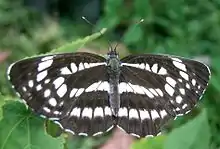Limenitidinae
The Limenitidinae are a subfamily of butterflies that includes the admirals and relatives. The common names of many species and genera reference military ranks or – namely the Adoliadini – titles of nobility (e.g., count, duke, earl, and marquis), in reference to these butterflies' large size, bold patterns, and dashing flight. In particular, the light stripe running lengthwise across the wings of many Limenitidini has reminded earlier authors of officers' (e.g. admiral, commander, commodore) shoulder marks and epaulets.
| Limenitidinae | |
|---|---|
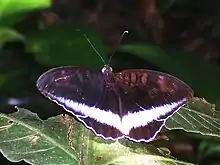 | |
| Tanaecia iapis (Adoliadini) | |
| Scientific classification | |
| Domain: | Eukaryota |
| Kingdom: | Animalia |
| Phylum: | Arthropoda |
| Class: | Insecta |
| Order: | Lepidoptera |
| Family: | Nymphalidae |
| Subfamily: | Limenitidinae Behr, 1864 |
| Tribes | |
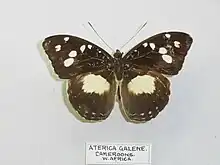
_xypete_MHNT_ventre.jpg.webp)
.jpg.webp)
_at_Samsing%252C_Duars%252C_West_Bengal_W_IMG_6109.jpg.webp)
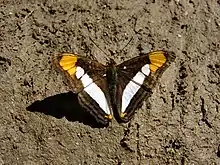
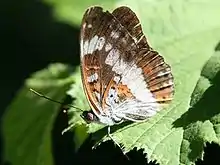
In flight, many of these butterflies have the habit of flapping their wings, so the (usually) bright upperside and the cryptic underside alternate for the observer, then gliding for prolonged distances, with the motionless wings held outstretched. The common names of some Limenitidinae – "aeroplanes", "clippers", or "gliders" – refer to this flight pattern.
Systematics
The Biblidinae are sometimes merged here. The present subfamily is also sometimes included as a tribe Limenitidini in the Nymphalinae. But in fact, their closest living relatives seem to be the Heliconiinae.[1]
The Limenitidinae are traditionally divided into four tribes, of which the Parthenini are the most basal lineage and the others form a close-knit and more apomorphic radiation. While this basic layout is likely to be fairly correct, a few genera cannot be easily assigned to the three "modern" tribes and seem to be somewhat intermediate. In particular, the delimitation of the Limenitidini versus the Neptini is in need of more study.[2]
Genera and selected species
The genera of Limenitidinae, sorted per tribe in the presumed phylogenetic sequence and with some species also listed, are:[2]
Tribe Parthenini Reuter, 1896
- Bhagadatta Moore, [1898]
- Parthenos – clippers
Tribe Adoliadini Doubleday, 1845
- Abrota Moore, 1857
- Bassarona Moore, [1897] – marquises, dukes
- Bassarona durga – blue duke
- Bassarona iva – grand duke
- Bassarona recta – redtail marquis
- Bassarona teuta – banded marquis
- Dophla Moore, [1880] – dukes
- Dophla evelina – redspot duke
- Euthalia – barons, dukes
- Euthaliopsis Neervoort van de Poll, 1896
- Lexias – archdukes
- Neurosigma Butler, 1868
- Tanaecia Butler, [1869] – counts
- Tanaecia cocytus – lavender count
- Tanaecia julii – common earl
- Tanaecia lepidea – grey count
- Tanaecia pelea – Malay viscount
- Aterica Boisduval, 1833 – forest-glade nymphs
- Bebearia Hemming, 1960
- Catuna Kirby, 1871 – pathfinders
- Crenidomimas Karsch, 1894
- Cynandra Schatz, [1887] – brilliant nymph
- Euphaedra Hübner, [1819] – typical foresters, figeaters
- Euptera Staudinger, [1891]
- Euriphene Boisduval, 1847
- Euryphaedra Staudinger, [1891]
- Euryphura Staudinger, [1891]
- Euryphurana Hecq, 1992 – noble commander
- Hamanumida Hübner, [1819] – guineafowl
- Harmilla Aurivillius, 1892 – elegant forester
- Pseudargynnis Karsch, 1892 – false fritillary
- Pseudathyma Staudinger, [1891] – false sergeants
Tribe Limenitidini Behr, 1864
- Adelpha Hübner, [1819] – sisters (sometimes included in Limenitis)
- Adelpha basiloides
- Adelpha bredowii – Mexico sister
- Adelpha californica – California sister (formerly in A. bredowii)
- Adelpha eulalia – Arizona sister (formerly in A. bredowii)
- Adelpha fessonia – band-celled sister
- Auzakia Moore, [1898]
- Auzakia danava – commodore
- Lelecella Hemming, 1939
- Limenitis – admirals
- Litinga Moore, [1898]
- Parasarpa Moore, [1898]
- Parasarpa dudu – white commodore
- Parasarpa zayla – bicolor commodore
- Patsuia Moore, [1898]
- Sumalia Moore, [1898]
- Sumalia daraxa – green commodore
- Sumalia zulema – scarce white commodore
- Moduza Moore, [1881] – commanders (sometimes included in Limenitis)
- Moduza procris – commander
- Tarattia Moore, [1898]
- Athyma – sergeants
- Pandita Moore, 1857
- Tacola Moore, [1898]
Tribe Neptini Newman, 1870
- Aldania Moore, [1896]
- Lasippa Moore, [1898]
- Neptis – typical sailers
- Pandassana Moore, [1898] (might belong in Neptis)
- Pantoporia Hübner, [1819] – lascars
- Pantoporia assamica – Assam lascar
- Pantoporia bieti – Tytler's lascar
- Pantoporia hordonia – common lascar
- Pantoporia karwara – Karwar lascar
- Pantoporia paraka – Perak lascar
- Pantoporia sandaka – extra lascar
- Phaedyma Felder, 1861 – aeroplanes
- Phaedyma shepherdi – common aeroplane
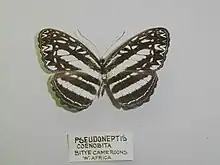
- Cymothoe Hübner, [1819] (Limenitidini or Neptini?) – typical gliders
- Cymothoe caenis
- Cymothoe hobarti – Hobart's red glider
- Cymothoe sangaris
- Harma Doubleday, [1848] – angular glider (Limenitidini or Neptini?)
- Kumothales Overlaet, 1940 (Limenitidini?)
- Lamasia Moore, [1898] (Limenitidini?)
- Lebadea Felder, 1861 (Limenitidini or Parthenini?)
- Lebadea martha – knight
- Pseudacraea – false acraeas (Limenitidini?)
- Pseudoneptis Snellen, 1882 – blue sailers (Limenitidini?)
- Chalinga Moore, 1898 (=Seokia Sibatani, 1943) (Limenitidini or Chalingini?)
Footnotes
- Wahlberg & Brower (2007a,b)
- Wahlberg & Brower (2007a), and see references in Savela (2008)
References
- Savela, Markku (2008): Markku Savela's Lepidoptera and Some Other Life Forms – Limenitidinae. Version of 31 August 2008. Retrieved 7 April 2009.
- Wahlberg, Niklas & Brower, Andrew V.Z. (2007a): Tree of Life Web Project – Limenitidinae. Version of 15 January 2007. Retrieved 7 April 2009.
- Wahlberg, Niklas & Brower, Andrew V.Z. (2007b): Tree of Life Web Project – Nymphalidae. Version of 19 February 2007. Retrieved 7 April 2009.
